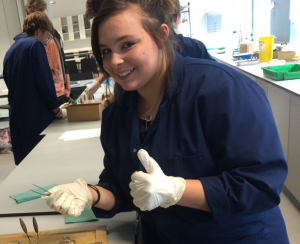Postgraduate researchers

Mercedes Beyna. In the context of neurodegenerative disease, scientists typically point to distinct populations of neurons that are dying. What is it about certain types of neurons that causes them to be especially vulnerable to death? Do they share a common mechanism of cell death? This is the enigma that keeps me at the laboratory bench. I am interested in the molecular determinants of neurodegenerative cell death. The hope is a clearer understanding of these processes will boost the field’s ability to, conversely, find ways of keeping neurons alive and healthy; knowledge that can ultimately contribute to making medicines that slow or prevent neurodegenerative conditions.
 Kirsten Williamson. I am interested in understanding how the transcription factor ATF3 may modulate tau-neurodegeneration. I will use cell models of Tauopathies and biochemical techniques to elucidate the role of ATF3 in neurodegeneration with the hypothesis that ATF3 may be neuroprotective in tauopathies.
Kirsten Williamson. I am interested in understanding how the transcription factor ATF3 may modulate tau-neurodegeneration. I will use cell models of Tauopathies and biochemical techniques to elucidate the role of ATF3 in neurodegeneration with the hypothesis that ATF3 may be neuroprotective in tauopathies.
 Lucy Scullard. Through my background in biochemistry, I developed an interest in neurological processes and neurodegenerative conditions. My work is in the area of synaptic proteostasis for neuronal stability. Particularly working on the Cysteine string protein alpha paradigm and TrKB turnover within neuronal stability in health and disease.
Lucy Scullard. Through my background in biochemistry, I developed an interest in neurological processes and neurodegenerative conditions. My work is in the area of synaptic proteostasis for neuronal stability. Particularly working on the Cysteine string protein alpha paradigm and TrKB turnover within neuronal stability in health and disease.